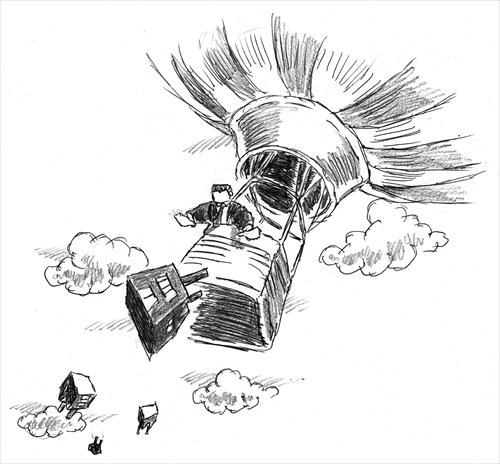HOME >> BUSINESS
China needs to speed up efforts to cut overcapacity
By Jeremy Garlick Source:Global Times Published: 2016-5-31 23:23:01

Illustration: Peter C. Espina/GT
These are interesting times for China's economy, with a lot on the line in terms of reform and the gradual shift to a new model. They are also vital times for the world, because of continuing shakiness in the markets in the wake of the 2008 financial crisis.The difference now, compared to even a few years ago, is that the world is watching China for clues as to how things are going to pan out. This is indicative of the fact that China has now more-or-less become the world's center of economic gravity.
The centrality of China is precisely why it is so crucial that Beijing gets its economic policy right over the period of the latest five-year plan. Fortunately, there are clear signs that the authorities are very much aware of the difficulty and delicacy of the task ahead of them.
The May 9 issue of People's Daily had an unusual 11,000-character article on the front page in which a reporter quizzed an anonymous source high up in the government about economic policy. The answers made stimulating reading, because they revealed just how acutely aware the authorities are of the need for steady but gradual reform that does not cause China's gigantic economic boat to capsize rather than continue to float.
Many observers - including The Economist, Ambrose Evans-Pritchard of The Daily Telegraph, and Zhu Ning, a professor at the Shanghai Advanced Institute of Finance and author of a new book entitled China's Guaranteed Bubble - are very concerned about the high levels of debt in the Chinese economy, as well as the large number of "zombie companies," or consistently loss-making firms that should really be closed down.
However, it seems that it is not only these critical observers who are worried, because the People's Daily article revealed that the authorities share the same concerns. They agree that the need to let market forces rather than central planning take control is paramount for the long-term health of the Chinese economy. Yet they also worry about short-term stability and the need to transform the economy without creating too much suffering among ordinary citizens or panic among investors.
So everybody perceives pretty much the same problems, as well as the same kind of harsh medicine needed to treat them: cutting down on industrial overcapacity, trying to rein in debt and credit, and dealing with zombie companies.
Similar concerns were afflicting China in the late 1990s. At that time a lot of successful restructuring occurred, even though the country went through a great deal of pain in terms of mass redundancies and the subsequent hardships endured by the families of newly unemployed workers. But now it seems that although these measures were relatively successful, there remains a need to take them to the next level and expose companies to the full force of the free market rather than having the State continuing to prop them up.
Stimulus measures in the wake of the 2008 global crisis have also taken their toll in terms of making companies believe that there is an unlimited supply of free cash, which constitutes a State-sponsored safety net for poor performers.
The question at this stage is really whether the necessary measures are being applied quickly enough. Given the excess of cheap steel flooding world markets, there has been much talk of shutting down steel factories, for instance, particularly those which are most egregiously loss-making; but it is unclear whether enough of the over-production is being brought to an end.
In Europe there is much concern about China unfairly dumping its excess steel in European markets, causing strain for local steel producers. This suggests that Chinese overcapacity in steel has still not been sufficiently reined in.
Of course, it's not easy to simply close down factories en masse and lay off workers. The Chinese government is trying to carry out restructuring while looking after employees, for example by encouraging companies to find alternative employment for laid-off workers wherever possible. This is commendable; but it is still not clear if the closures and reforms are being carried out rapidly enough, or whether non-performing companies are still being propped up. It looks as if the pace of change needs to be increased in order to reduce oversupply and to prevent debt from continuing to spiral out of control.
As critics continue to point out, there is still too much easy credit in China, which could result in a new property market bubble. This problem arguably needs to be addressed with more urgency than has so far been the case if the nation is to avoid a hard landing.
Observers wait with baited breath to see if Beijing can pull off what looks to be a task of near-Herculean proportions successfully in the coming months and years.
The author is a lecturer in international relations with the Jan Masaryk Centre for International Studies at the University of Economics in Prague. bizopinion@globaltimes.com.cn
Posted in: Expert assessment